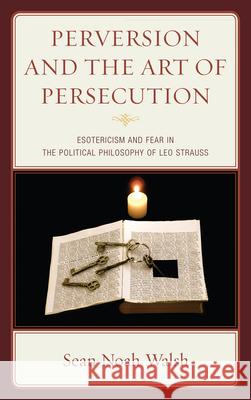Perversion and the Art of Persecution: Esotericism and Fear in the Political Philosophy of Leo Strauss » książka
Perversion and the Art of Persecution: Esotericism and Fear in the Political Philosophy of Leo Strauss
ISBN-13: 9780739171806 / Angielski / Twarda / 2012 / 192 str.
Perversion and the Art of Persecution: Esotericism and Fear in the Political Philosophy of Leo Strauss
ISBN-13: 9780739171806 / Angielski / Twarda / 2012 / 192 str.
(netto: 423,89 VAT: 5%)
Najniższa cena z 30 dni: 444,17
ok. 30 dni roboczych
Bez gwarancji dostawy przed świętami
Darmowa dostawa!
In this critical work on the political thought of Leo Strauss, Sean Noah Walsh addresses Leo Strauss's claims about esotericism in the philosophic texts of Plato. He challenges Strauss's understanding of esoteric writing as an attempt by Plato to secretly encode the highest truths "exclusively between the lines" in order to avoid persecution. Indeed, through the character of Socrates, the speaker with whom Plato is inextricably associated, Walsh asserts that Plato's exoteric writings were sufficiently incendiary and provocative to demonstrate that a fear of persecution was not his highest priority. The politics that follow from Strauss's thought depend on the interpretation of these Platonic philosophical bases and by analyzing how the problem of fear has been confronted in the works of Plato and Leo Strauss, Walsh offers a direct and thorough account of the politics that emerge from Strauss's esoteric reading of political philosophy. Applying Lacanian psychoanalysis, Walsh investigates the discourse of Straussian esotericism. and examines Plato's writing for examples of exoteric risk, subjecting both Plato and Strauss's writings to Lacan's psychoanalytic technique for interpreting the function of desire in discourse. Given the continuing influence of Strauss's ideas on contemporary politics, particularly within American foreign policy, Walsh's examination of this Straussian esotericism for these effects will prove an interesting read for political theorists, international relations scholars, and philosophers alike.











